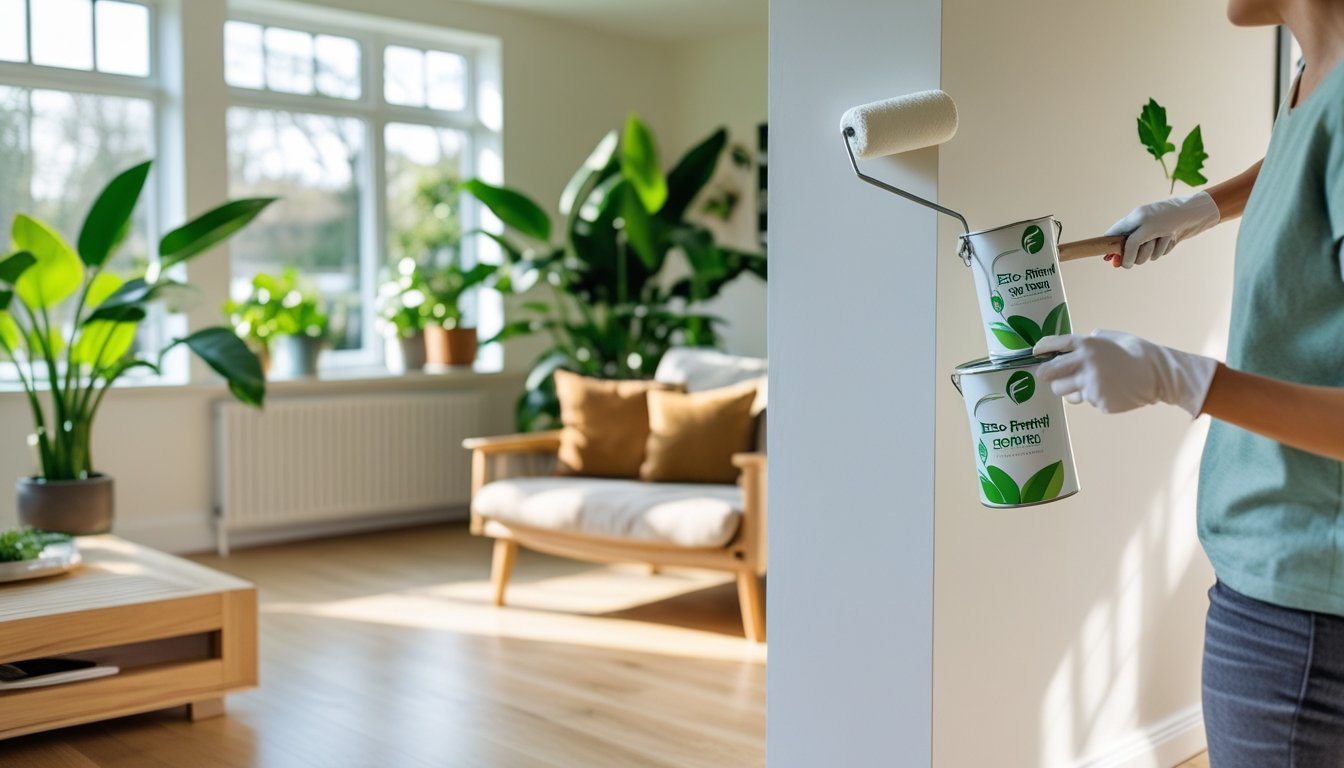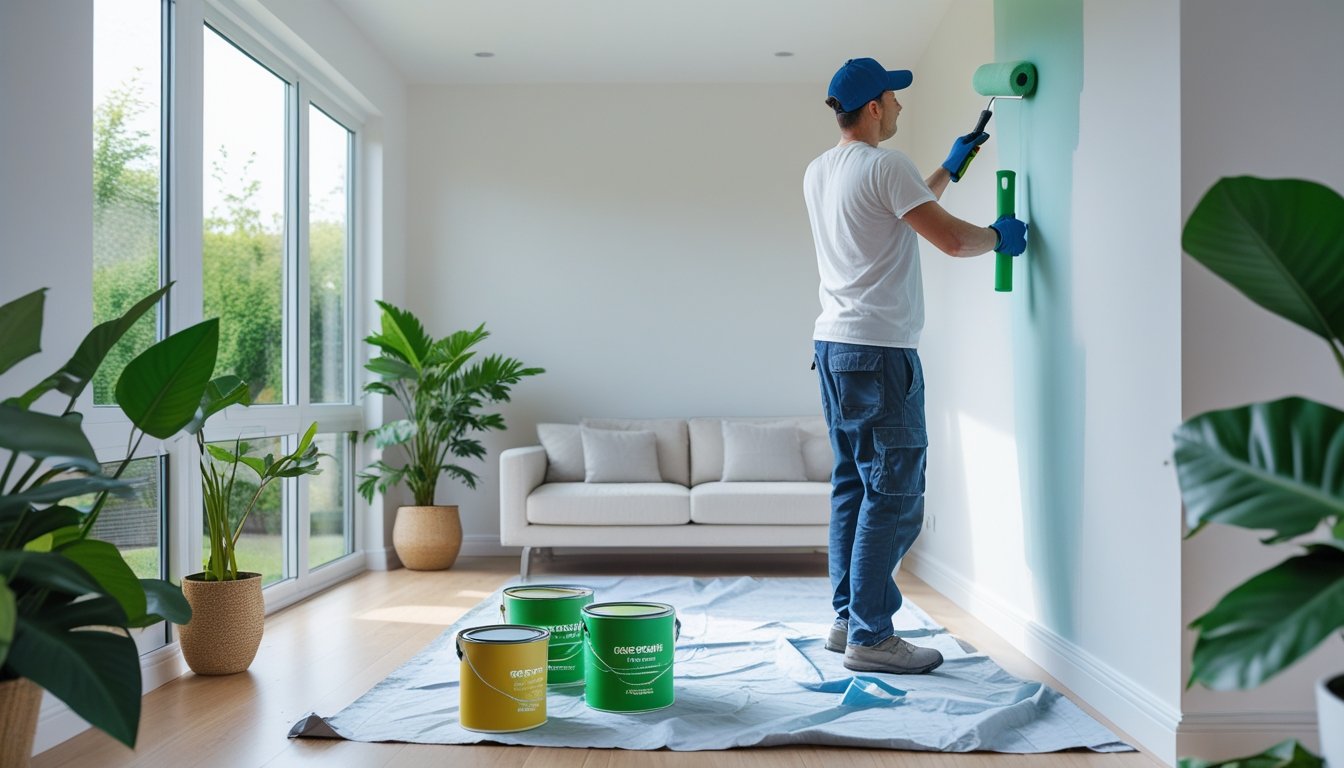Late updated: 01 Oct 2025 12:10
Written by: Eleanor Hartman
The Benefits Of Using Eco-Friendly Paint In UK Homes: Enhancing Indoor Air Quality
Eco-friendly paint has become an essential consideration for UK homeowners prioritising health and sustainability. By focusing on low-VOC formulations and natural ingredients, these paints not only enhance indoor air quality but also minimise environmental impact. Switching to eco-friendly paints allows us to create healthier living spaces, directly reducing exposure to harmful toxins.

In recent years, the push for environmentally conscious living has touched nearly every aspect of home design. Eco-friendly paint options offer a sustainable solution, supporting both ethical production and eco-conscious consumption. As technology advances, these alternatives provide superior coverage and durability, ensuring that choosing sustainability doesn’t mean compromising on quality.
The UK market now features numerous brands that cater to eco-conscious consumers, providing paints made with water-based resins and plant-based oils. Adopting these paints contributes to a greener planet while also offering peace of mind regarding the health and safety of our families.
Key Takeaways
- Eco-friendly paints improve indoor air quality by reducing toxins.
- Using sustainable paints minimises our environmental impact.
- Quality and durability are maintained with eco-friendly options.
Key Benefits of Using Eco-Friendly Paint in UK Homes

Choosing eco-friendly paint offers significant advantages for UK homes. By improving indoor air quality and reducing exposure to harmful chemicals, these paints help create a healthier environment for both families and pets. They provide a sustainable alternative without compromising on quality or performance.
Improved Indoor Air Quality
Eco-friendly paints significantly enhance indoor air quality. These paints typically contain fewer volatile organic compounds (VOCs) than conventional paints, which means fewer pollutants are released into the air. This reduction in airborne toxins makes our homes cleaner and safer. Using eco-friendly paint contributes to a healthier living environment by minimising the risk of respiratory issues and any discomfort caused by harsh chemical odours. This benefit is particularly important in homes where children and pets are present, as they are more vulnerable to air quality issues.
Reducing Exposure to Volatile Organic Compounds
Volatile organic compounds are commonly found in regular paints and can have adverse health effects. Eco-friendly paints are specially formulated to reduce or eliminate these compounds. By choosing low-VOC options, we significantly lower the risk of exposure to harmful chemicals. This reduction not only benefits human health but also limits the environmental impact. With eco-friendly paint, we can decorate our homes without compromising on colour intensity or durability, thus making it a viable option for sustainable living.
Health Advantages for Families and Pets
The health benefits of eco-friendly paints extend to everyone in the household. Reduced exposure to toxins means fewer health risks such as headaches, dizziness, and respiratory diseases. This is particularly beneficial for allergy sufferers and those with pre-existing conditions. Pets also breathe easier in well-ventilated spaces free from noxious fumes. The use of non-toxic pigments ensures that even the most sensitive family members can enjoy a safe and beautiful home. By investing in eco-friendly paint, we promote well-being and create a safe haven for our loved ones.
Eco-friendly paints provide a balanced solution for those who are environment-conscious and health-focused. By integrating these products into our spaces, we elevate not just the aesthetics but also the air quality and overall welfare of our homes.
Sustainability and Environmental Impact
Incorporating eco-friendly paint into our homes can significantly enhance sustainability efforts and reduce environmental harm. By choosing products that focus on safer ingredients and sustainable practices, we contribute positively to the planet's health.
Supporting Sustainable Practices in the Paint Industry
The paint industry has seen a gradual shift towards sustainable practices, largely driven by consumer demand for environmentally conscious products. Eco-friendly paints are designed using non-toxic ingredients and biodegradable materials, which reduce levels of harmful volatile organic compounds (VOCs).
These products are an innovative response to environmental challenges. Companies are increasingly investing in green technologies that include biodegradable packaging and carbon-neutral production. Such changes support circular economy initiatives, which aim to minimise waste and encourage the recycling of materials.
Minimising Your Carbon Footprint
Choosing eco-friendly paints is a practical step we can take to reduce our carbon footprint. Traditional paints often contain high levels of VOCs that contribute to indoor air pollution, affecting air quality and climate change. By selecting water-based or plant-based paints, we can significantly lower emissions and improve health outcomes in our living spaces.
These paints not only breathe better indoors but also support global efforts in climate preservation. Our choices can inspire broader environmental responsibility, encouraging others to consider the long-term impact of their purchasing decisions.
The Role of Brands Like Ecos Paints
Brands such as Ecos Paints are leading the charge by offering an array of environmentally friendly options. Known for their commitment to sustainability, Ecos Paints avoids harmful chemicals and promotes the use of natural ingredients. Their paints are free from odours and VOCs, making them a healthier choice for homes.
Furthermore, brands like this adhere to strict environmental standards that ensure their production processes and product offerings are as green as possible. By choosing such reputable brands, we not only receive quality products but also ensure our commitment to environmental sustainability is met with genuine action.
Frequently Asked Questions

Eco-friendly paint offers a range of benefits, from enhancing environmental sustainability to improving indoor air quality. It can also influence property value and energy efficiency. Understanding the ingredients and certifications of these paints can guide informed choices.
What are the environmental advantages of using eco-friendly paint in UK residences?
Eco-friendly paints have lower levels of volatile organic compounds (VOCs), reducing air pollution and harmful emissions. These paints often incorporate sustainable materials that minimise the carbon footprint. Choosing such paints supports ethical production and contributes to a greener environment.
How does eco-friendly paint contribute to healthier indoor air quality in homes?
Using eco-friendly paint can significantly improve indoor air quality. These paints release fewer toxins and hazardous chemicals, leading to a reduction in indoor air pollutants. This results in a healthier living space for occupants, with decreased risks of respiratory issues and allergies.
In what ways can using environmentally safe paint impact energy consumption in UK properties?
Eco-friendly paints often possess insulating properties. They can reflect more sunlight, helping to maintain a stable indoor temperature. This can reduce the need for extensive heating or cooling, thus lowering energy bills and enhancing a home's energy efficiency.
What ingredients should one look for in eco-friendly paint to ensure it's truly sustainable?
Look for paints that are low in VOCs and free from lead and other harmful chemicals. Sustainable ingredients may include natural pigments and plant-based binders. Checking for water-based formulations can also be a reliable indicator of environmental friendliness.
Can the use of eco-friendly paint improve the value of a property in the UK housing market?
Properties painted with eco-friendly paints may attract eco-conscious buyers. The improved indoor air quality and sustainability features can enhance the overall appeal, potentially increasing the property's market value. Energy-efficient homes can also benefit from favourable valuations.
What certifications or labels should UK consumers check for when selecting eco-friendly paint?
Look for labels such as the EU Ecolabel or the Green Seal certification. These certifications indicate compliance with environmental standards and reassure consumers of the product's eco-friendly credentials. Other recognised labels include the Blue Angel and Cradle to Cradle certifications.